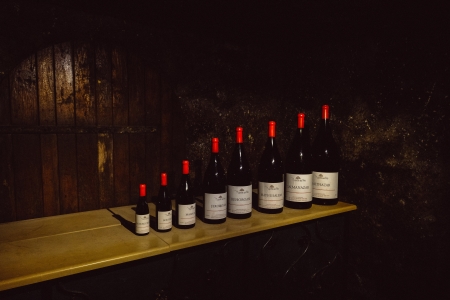#6 Wine Stocks To Invest In 2022
Gone are the days when wine was a beverage reserved solely for the the social elite. Hundreds of millions of consumers worldwide now have access to wine as a beverage and investment. If you want to diversify your portfolio, investing in wine stocks could be an excellent option. Wine stocks can yield more stable returns and decent dividend income compared to some other types of stocks. Still, it’s critical to choose the right companies to invest in if you want to make the most of your experience.
To help you get started, Vint has some wine stocks that you might want to check out this year.
##1. Willamette Valley Vineyards (WVVI)
Willamette Valley Vineyards Inc. is based in Oregon and produces wine for sale internationally, focusing on the United States. It specializes in
- Chardonnay
- Pinot Noir
- Pinot Blanc
- Pinot Gris
- Riesling
- Rosé
- and Sparkling Wines
- The Griffin Creek label produces
- Cabernet Sauvignon
- Grenache
- Cabernet Franc
- Tempranillo
- Malbec
- Merlot
- Syrah
- Viognier
- The Griffin (red blend)
- Under the Tualatin Estate Vineyards brand, it releases a semi-sparkling Muscat wine, and it sells Oregon Blossom wine through the Oregon Cellars brand.
Willamette Valley Vineyards has over 30 years of experience in the wine industry, and it’s one of the leading Pinot Noir producers in the United States.
This company is one you’ll definitely want to monitor throughout 2022. There’s no telling what turns the wine market could take in the next few years, but we can confidently say that Oregon will continue to produce high-quality wines.
##2. The Duckhorn Portfolio (NAPA) The Duckhorn Portfolio stock listing is newer to the field. It produces luxury and ultra-luxury wines through a diverse portfolio of wine brands. This includes Duckhorn Vineyards, Migration, Decoy, Goldeneye, Paraduxx, Kosta Browne, Green Wing, Postmark, and Canvas Back. Duckhorn sells wines directly to consumers and through various wine distribution companies worldwide.
This wine stock went public in March 2021 through a traditional IPO, making about 300 million dollars.
According to their reporting, Duckhorn reported a 5-year revenue growth rate of 18% and 11 years of organic growth. From 2015 to 2020, average EBITDA margins stayed at about 40% and grew 56.7 million dollars, yielding 17% AGR. As wine tasting rooms and bars reopen in California, Duckhorn (and many other U.S. wine companies) might experience a boost in earnings and margins from hospitality channels as the pandemic wanes.
When thinking about how the wine industry could shift and change in the wake of the pandemic, you may want to consider looking into companies like The Duckhorn Portfolio. Innovative when compared to their peers, Duckhorn is taking a unique approach to luxury wine, and we’re excited about it.
##3. Andrew Peller (ADW-B) The Canadian Andrew Peller limited produces, bottles, and markets wines and craft alcoholic beverages through a range of brands, including:
- Peller Estates
- Thirty Bench
- Trius
- Red Rooster
- Sandhill
- Wayne Gretzky
- Conviction
- Raven Conspiracy
- Tinhorn Creek Vineyard
- Black Hills Estate Winery
- Gray Monk Estate Winery
- Other Andrew Peller labels include Peller Family Vineyard, Black Cellar, Copper Moon, XOXO, Domaine D’or, Sommet, Royal, Schloss Laderheim, and Hochtaler.
It also produces No Boats on Sunday ciders and beer, spirits, cream whisky, and seltzers under the Wayne Gretzky no.99 label.
Andrew Peller’s signature beverage is Icewine. Along with that wine, we’re intrigued by everything else Andrew Peller produces, from wine to spirits and beer. They’re a company with a diverse range of products that have performed consistently in recent years.
##4. Brown-Forman Corporation (BF-B) Based in Kentucky and founded in 1870, Brown-Forman Corporation is in the business of selling alcoholic drinks. The company’s shares have given investors a return of over 18% in recent years.
You may recognize some of its world-famous brands, including Jack Daniel’s, Canadian Mist, Woodford Reserve, and GlenDronach.
As one of the world’s largest publicly traded wine companies, Brown-Forman also produces Sonoma-Cutrer wine. They’re one company you might want to watch if you’re interested in following titans in the wine and spirits industry. They’ve been growing steadily over the past five years, which has certainly gotten our attention.
##5. Constellation Brands (STZ) Based in New York and founded in 1945, Constellation Brands, Inc. markets many different alcoholic products, including beer, wine, and spirits. This stock has returned more than 28% to investors in recent years. Along with world-famous beer brands (e.g., Corona, Modello, Pacifico), Constellation Brands produce:
- Cook’s California Champagne
- 7 Moons
- Crafters Union
- Meiomi
- Mount Veeder
- Ruffino
- Kim Crawford
- The Dreaming Tree
- Charles Smith
- Cooper & Thief
- and many other wine-related brands.
This company sold to more than 125 countries and experienced a 1.55% dividend yield in 2020. It has a market cap of 36.95 billion USD, a 1.40% YoY revenue growth, and 10.08% stock price growth.
Over the last five years, Constellations Brands has stayed on our watchlist for stocks in the wine and spirits industry. They’re one that might interest you if you follow the beer industry as well as wine.
##6. Moet Hennessy Louis Vuitton (LVMH) LVMH is a world-famous luxury brand name that also specializes in wine spirits. Founded in 1987, this company owns more than 20 wine houses in Champagne, Burgundy, Bordeaux, and other renowned regions.
With a market cap of 210.78 billion EUR, this Paris, France company saw a 14% YoY revenue growth in 2019 with a stock price growth of 41.02%. Like Brown-Forman, LVMH has steadily improved performance over the last five years.
What Are the Disadvantages of Wine Stocks?
Investing in wine stocks can diversify your portfolio, but it also comes with some drawbacks to consider. Remember, all stock markets are volatile and subject to economic crises, monetary policy changes, trade-in balances, and other factors.
Also, it can be challenging to know when and how to invest in stocks, which means most investors hire stockbrokers to manage their investments. Brokerage fees can get expensive and significantly reduce your wine stock returns over time.
Not to mention that most investors conduct a lot of research into public companies on their own before determining which one(s) to invest in. Furthermore, a typical wine investor has to constantly monitor each company’s share price to determine the ideal time for selling your stock. That means the process of investing in wine stocks can take quite a bit of time and energy.
##Should You Buy Your Investment Wines? If your aim is not to invest in conventional investments (e.g., dividend stocks, mutual funds, ETFs, etc.), there is an alternative that some investors try – buying and selling investment wines. This would typically entail buying a bottle of wine and selling it after three to five years at a higher price through wine brokers, wine exchanges, auctions, or wineries. DIY wine investing, however, requires you to store in temperature controlled facilities so that the wine so that it can age and potentially yield a return on your investment. This means that you will either have to build or convert a cellar at your home, buy an intrusive wine friedge, or keep your wine in a professional or private cellar.
Also, without the proper due diligence, you run the risk of investing in counterfeit fine wine. When buying your wine for investing, keep these facts in mind.
##“Wining” Down
Investing in wine is becoming more and more popular, and there are many different ways to get in on it. Many investors invest in wine stocks like those mentioned above or by building their own wine cellar, but there are pros and cons to every option. Another option is investing through Vint, the only SEC-qualified wine and spirits investing platform. Even if you have no prior experience with fine wine investing, our efficient, transparent, and low-minimum model can be an easy way to diversify your portfolio and build your wealth. Visit our website today to learn more and sign up.
Sources: LVMH Moet Hennessy Louis Vuitton SE | Investing.com 5 Tips for Diversifying Your Portfolio | Investopedia Brokerage Fees: What They are and How They Work | NerdWallet


